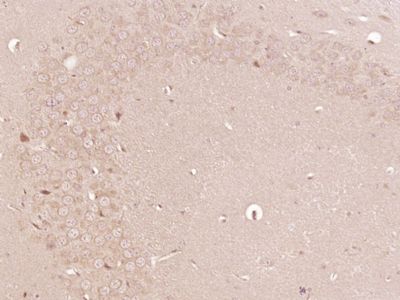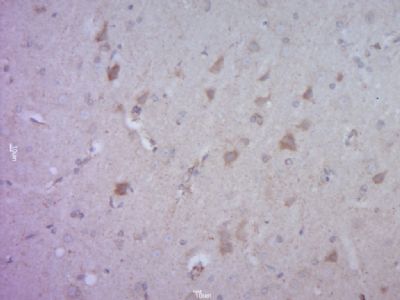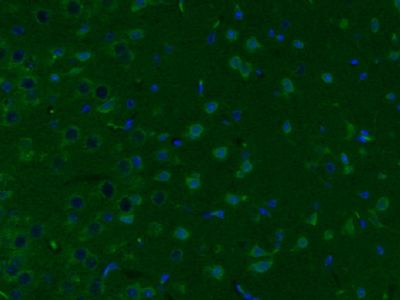Product Name :
KLK8 Polyclonal Antibody Background :
Kallikrein 8 (hK8), also known as neuropsin, brain serine protease 1 (BSP1), tumor associated differentially expressed gene 14 (TADG14), PRSS19, HNP and ovasin, is a trypsin like serine protease. Originally described from mouse brain, KLK8 was implicated in neural plasticity and learning. Kallikrein 8 is thought to be involved in neurite outgrowth and fasciculation during nervous system development. Kallikrein 8 is induced in neurite injury, and Kallikrein 8 has been shown to be elevated in the hippocampus on Alzheimer’s patients’ brains. Animal models of autoimmune encephalomyelitis (EAE) show elevated Kallikrein 8 production. Kallikrein 8 null mice have aberrant synapses in their hippocampus, compared to wild type mice, and are predisposed to seizures. Kallikrein 8 is thought to regulate the early phase of long-term potentiation (LTP), possibly by cleaving fibronectin and other substrates. Kallikrein 8 is also found in the uterus, where it is hormonally regulated. Cervical cancer cell lines express high levels of Kallikrein 8, and it may be useful as a tumor marker. Kallikrein 8 is not limited to the brain and uterus, as many tissues and cell lines make the protein. Endogenous inhibitors include serine protease inhibitor 3 and protein C inhibitor, although Kallikrein 8 can be found complexed to a number of different protease inhibitors. Product :
0.01M TBS(pH7.4) with 1% BSA, 0.03% Proclin300 and 50% Glycerol. Storage&Stability :
Store at 4°C short term. Aliquot and store at -20°C long term. Avoid freeze-thaw cycles. Specificity :
KLK8 Polyclonal Antibody detects endogenous levels of KLK8 protein. Immunogen :
KLH conjugated synthetic peptide derived from human KLK8:51-150/260 Conjugate :
Unconjugated Modification :
Unmodification
KLK8 Polyclonal Antibody Background :
Kallikrein 8 (hK8), also known as neuropsin, brain serine protease 1 (BSP1), tumor associated differentially expressed gene 14 (TADG14), PRSS19, HNP and ovasin, is a trypsin like serine protease. Originally described from mouse brain, KLK8 was implicated in neural plasticity and learning. Kallikrein 8 is thought to be involved in neurite outgrowth and fasciculation during nervous system development. Kallikrein 8 is induced in neurite injury, and Kallikrein 8 has been shown to be elevated in the hippocampus on Alzheimer’s patients’ brains. Animal models of autoimmune encephalomyelitis (EAE) show elevated Kallikrein 8 production. Kallikrein 8 null mice have aberrant synapses in their hippocampus, compared to wild type mice, and are predisposed to seizures. Kallikrein 8 is thought to regulate the early phase of long-term potentiation (LTP), possibly by cleaving fibronectin and other substrates. Kallikrein 8 is also found in the uterus, where it is hormonally regulated. Cervical cancer cell lines express high levels of Kallikrein 8, and it may be useful as a tumor marker. Kallikrein 8 is not limited to the brain and uterus, as many tissues and cell lines make the protein. Endogenous inhibitors include serine protease inhibitor 3 and protein C inhibitor, although Kallikrein 8 can be found complexed to a number of different protease inhibitors. Product :
0.01M TBS(pH7.4) with 1% BSA, 0.03% Proclin300 and 50% Glycerol. Storage&Stability :
Store at 4°C short term. Aliquot and store at -20°C long term. Avoid freeze-thaw cycles. Specificity :
KLK8 Polyclonal Antibody detects endogenous levels of KLK8 protein. Immunogen :
KLH conjugated synthetic peptide derived from human KLK8:51-150/260 Conjugate :
Unconjugated Modification :
Unmodification
-
 Paraformaldehyde-fixed, paraffin embedded (Mouse brain); Antigen retrieval by boiling in sodium citrate buffer (pH6.0) for 15min; Block endogenous peroxidase by 3% hydrogen peroxide for 20 minutes; Blocking buffer (normal goat serum) at 37°C for 30min; Antibody incubation with (KLK8) Polyclonal Antibody, Unconjugated at 1:400 overnight at 4°C
Paraformaldehyde-fixed, paraffin embedded (Mouse brain); Antigen retrieval by boiling in sodium citrate buffer (pH6.0) for 15min; Block endogenous peroxidase by 3% hydrogen peroxide for 20 minutes; Blocking buffer (normal goat serum) at 37°C for 30min; Antibody incubation with (KLK8) Polyclonal Antibody, Unconjugated at 1:400 overnight at 4°C -
 Paraformaldehyde-fixed, paraffin embedded (Rat brain); Antigen retrieval by boiling in sodium citrate buffer (pH6.0) for 15min; Block endogenous peroxidase by 3% hydrogen peroxide for 20 minutes; Blocking buffer (normal goat serum) at 37°C for 30min; Antibody incubation with (KLK8) Polyclonal Antibody, Unconjugated at 1:400 overnight at 4°C
Paraformaldehyde-fixed, paraffin embedded (Rat brain); Antigen retrieval by boiling in sodium citrate buffer (pH6.0) for 15min; Block endogenous peroxidase by 3% hydrogen peroxide for 20 minutes; Blocking buffer (normal goat serum) at 37°C for 30min; Antibody incubation with (KLK8) Polyclonal Antibody, Unconjugated at 1:400 overnight at 4°C -
 Paraformaldehyde-fixed, paraffin embedded (Rat brain); Antigen retrieval by boiling in sodium citrate buffer (pH6.0) for 15min; Block endogenous peroxidase by 3% hydrogen peroxide for 20 minutes; Blocking buffer (normal goat serum) at 37°C for 30min; Antibody incubation with (KLK8) Polyclonal Antibody, Unconjugated at 1:400 overnight at 4°C
Paraformaldehyde-fixed, paraffin embedded (Rat brain); Antigen retrieval by boiling in sodium citrate buffer (pH6.0) for 15min; Block endogenous peroxidase by 3% hydrogen peroxide for 20 minutes; Blocking buffer (normal goat serum) at 37°C for 30min; Antibody incubation with (KLK8) Polyclonal Antibody, Unconjugated at 1:400 overnight at 4°C
Bioworld Biotech only provide peptides for our antibodies and do not provide additional peptide customization services.
Price/Size :
USD 368/1mg/vial
Tips:
For phospho antibody, we provide phospho peptide(0.5mg) and non-phospho peptide(0.5mg).Describe :
Blocking peptides are peptides that bind specifically to the target antibody and block antibody binding. These peptide usually contains the epitope recognized by the antibody. Antibodies bound to the blocking peptide no longer bind to the epitope on the target protein. This mechanism is useful when non-specific binding is an issue, for example, in Western blotting (WB) and Immunohistochemistry (IHC). By comparing the staining from the blocked antibody versus the antibody alone, one can see which staining is specific; Specific binding will be absent from the western blot or IHC performed with the neutralized antibody.Formula:
Synthetic peptide was lyophilized with 100% acetonitrile and is supplied as a powder. Reconstitute with 0.1 ml DI water for a final concentration of 10 mg/ml.The purity is >90%,tested by HPLC and MS.
Storage:
The freeze-dried powder is more stable. For short time at 2-8°C. For long term storage store at -20°C.
Note :
This product is for research use only (RUO only). Not for use in diagnostic or therapeutic procedures.
 KLK8 Polyclonal Antibody
KLK8 Polyclonal Antibody  Datasheet
Datasheet COA
COA MSDS
MSDS SHIP
SHIP